委婉英语表达方法
表示“委婉”的各种英语说法
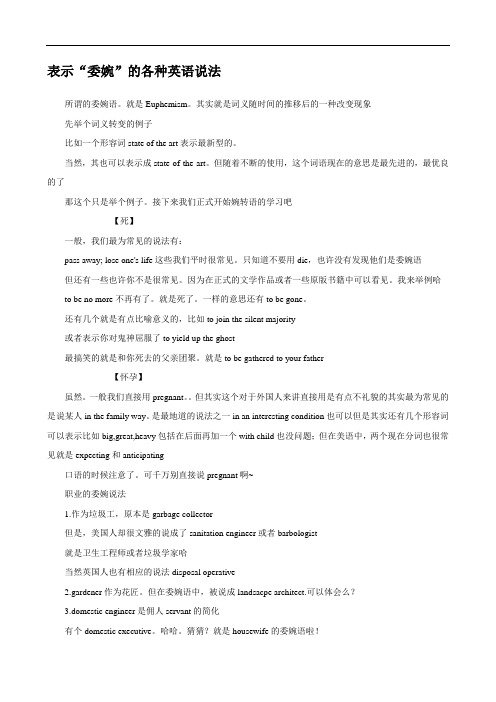
表示“委婉”的各种英语说法所谓的委婉语。
就是Euphemism。
其实就是词义随时间的推移后的一种改变现象先举个词义转变的例子比如一个形容词state of the art表示最新型的。
当然,其也可以表示成state-of-the-art。
但随着不断的使用,这个词语现在的意思是最先进的,最优良的了那这个只是举个例子。
接下来我们正式开始婉转语的学习吧----------------【死】------------------------------一般,我们最为常见的说法有:pass away; lose one's life这些我们平时很常见。
只知道不要用die,也许没有发现他们是委婉语但还有一些也许你不是很常见。
因为在正式的文学作品或者一些原版书籍中可以看见。
我来举例哈to be no more不再有了。
就是死了。
一样的意思还有to be gone。
还有几个就是有点比喻意义的,比如to join the silent majority或者表示你对鬼神屈服了to yield up the ghost最搞笑的就是和你死去的父亲团聚。
就是to be gathered to your father----------------【怀孕】------------------------------虽然。
一般我们直接用pregnant。
但其实这个对于外国人来讲直接用是有点不礼貌的其实最为常见的是说某人in the family way。
是最地道的说法之一in an interesting condition也可以但是其实还有几个形容词可以表示比如big,great,heavy包括在后面再加一个with child也没问题;但在美语中,两个现在分词也很常见就是expecting和anticipating口语的时候注意了。
可千万别直接说pregnant啊~职业的委婉说法1.作为垃圾工,原本是garbage collector但是,美国人却很文雅的说成了sanitation engineer或者barbologist就是卫生工程师或者垃圾学家哈当然英国人也有相应的说法disposal operative2.gardener作为花匠。
英语中的委婉表示
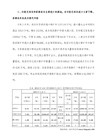
以上这些方法,大体上都贯穿了两个原则:一是若即若离的原则,一是美好中听的原则。一般说来,委婉语有三个方面的作用。一是避免刺激,给人以安慰;二是消除粗俗,给人以文雅;三是摒弃陈腐பைடு நூலகம்给人以新颖。善于委婉,这是心灵美、修养高的表现。
英语委婉语一般可分成两大类:传统委婉语(traditional euphemisms)和文体委婉语stylistic euphemisms。所谓传统委婉语亦称是与禁忌语密切相关的。象生、病、死、葬、性、裸、拉、撒等禁忌事物,如果直接表达,那就是禁忌语,给人的感觉是粗鄙,生硬,刺耳,无礼。反之,如果间接表达,这就是委婉语,给人的印象是典雅,含蓄,中听,有礼。所谓文体委婉语,亦称实际上是恭维话、溢美之词,与禁忌语并无关系。英、美人(尤其是当代美国人)在交际过程中,为了表示礼貌,为了避免刺激,或是为了争取合作,有时会采用夸饰的手法,对一些令人不快的事物以美言相称。
* When he met her, he had the hots for her.(当他见到她,他就对她爱慕不已。)
(多半指 sexual attraction。)
例如说,女对男的没有兴趣,那么也可以说:
* She did not feel any attraction toward him.(她对他毫无兴趣); 或
注意:如果说: She is as sneaky(或 cunning)as a fox.
又是指她像狐狸一样的狡猾。
表示“委婉”的各种英语说法

表示“委婉”的各种英语说法表示“委婉”的各种英语说法所谓的委婉语。
就是Euphemism。
其实就是词义随时间的推移后的一种改变现象先举个词义转变的例子比如一个形容词state of the art表示最新型的。
当然,其也可以表示成state-of-the-art。
但随着不断的使用,这个词语现在的意思是最先进的,最优良的了那这个只是举个例子。
接下来我们正式开始婉转语的学习吧----------------【死】------------------------------一般,我们最为常见的说法有:pass away; lose one's life这些我们平时很常见。
只知道不要用die,也许没有发现他们是委婉语但还有一些也许你不是很常见。
因为在正式的文学作品或者一些原版书籍中可以看见。
我来举例哈to be no more不再有了。
就是死了。
一样的意思还有to be gone。
还有几个就是有点比喻意义的,比如to join the silent majority 或者表示你对鬼神屈服了to yield up the ghost最搞笑的就是和你死去的父亲团聚。
就是to be gathered to your father----------------【怀孕】------------------------------虽然。
一般我们直接用pregnant。
但其实这个对于外国人来讲直接用是有点不礼貌的其实最为常见的是说某人in the family way。
是最地道的说法之一in an interesting condition也可以但是其实还有几个形容词可以表示比如big,great,heavy包括在后面再加一个with child也没问题;但在美语中,两个现在分词也很常见就是expecting 和anticipating口语的时候注意了。
可千万别直接说pregnant啊~职业的委婉说法1.作为垃圾工,原本是garbage collector但是,美国人却很文雅的说成了sanitation engineer或者barbologist就是卫生工程师或者垃圾学家哈当然英国人也有相应的说法disposal operative2.gardener作为花匠。
英语中委婉语气的表达法
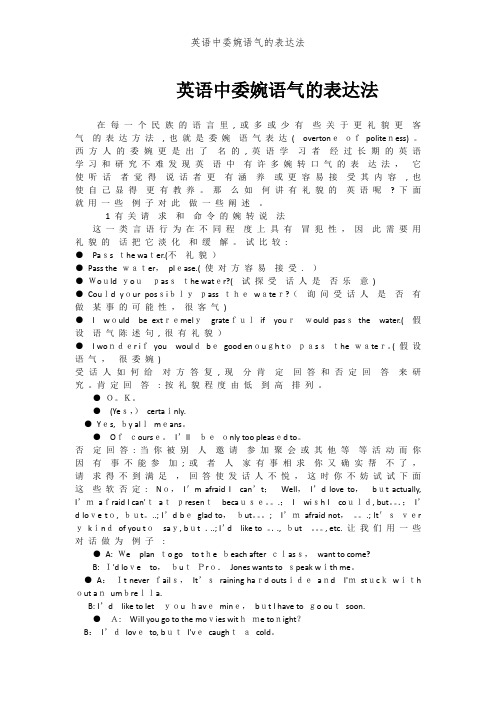
英语中委婉语气的表达法在每一个民族的语言里, 或多或少有些关于更礼貌更客气的表达方法, 也就是委婉语气表达(overtoneofpoliteness) 。
西方人的委婉更是出了名的, 英语学习者经过长期的英语学习和研究不难发现英语中有许多婉转口气的表达法,它使听话者觉得说话者更有涵养或更容易接受其内容, 也使自己显得更有教养。
那么如何讲有礼貌的英语呢? 下面就用一些例子对此做一些阐述。
1 有关请求和命令的婉转说法这一类言语行为在不同程度上具有冒犯性,因此需要用礼貌的话把它淡化和缓解。
试比较:●Pass the water.(不礼貌)●Pass the water,please.( 使对方容易接受.)●Would youpassthe water?(试探受话人是否乐意)●Could your possiblypass thewater?(询问受话人是否有做某事的可能性,很客气)●I would be extremelygratefulif yourwould passthe water.(假设语气陈述句, 很有礼貌)●I wonder ifyou wouldbegood enough topassthe water。
( 假设语气,很委婉)受话人如何给对方答复, 现分肯定回答和否定回答来研究。
肯定回答: 按礼貌程度由低到高排列。
●O。
K。
●(Yes,)certainly.●Yes, by allmeans。
●Ofcourse。
I’llbeonly too pleased to。
否定回答: 当你被别人邀请参加聚会或其他等等活动而你因有事不能参加; 或者人家有事相求你又确实帮不了,请求得不到满足,回答使发话人不悦,这时你不妨试试下面这些软否定:No,I'm afraid I can’t;Well,I’d love to,but actually, I’mafraid I can'tatpresentbecause。
英语委婉语气表达法
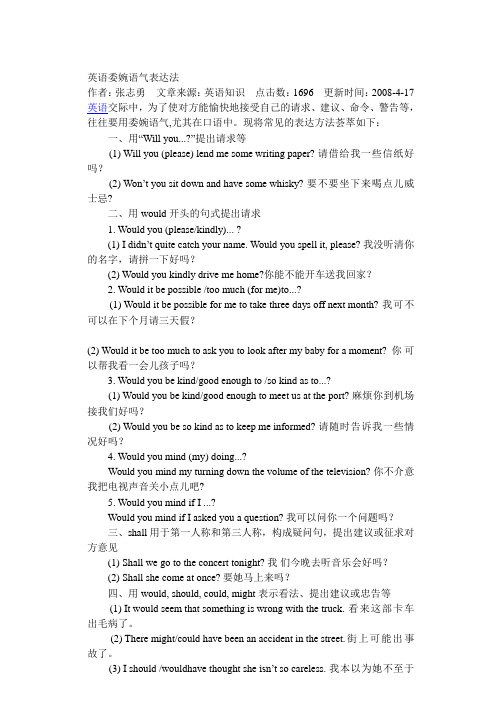
英语委婉语气表达法作者:张志勇文章来源:英语知识点击数:1696 更新时间:2008-4-17 英语交际中,为了使对方能愉快地接受自己的请求、建议、命令、警告等,往往要用委婉语气,尤其在口语中。
现将常见的表达方法荟萃如下:一、用“Will you...?”提出请求等(1) Will you (please) lend me some writing paper? 请借给我一些信纸好吗?(2) Won’t you sit down and have some whisky? 要不要坐下来喝点儿威士忌?二、用would开头的句式提出请求1. Would you (please/kindly)... ?(1) I didn’t quite catch your name. Would you spell it, please? 我没听清你的名字,请拼一下好吗?(2) Would you kindly drive me home?你能不能开车送我回家?2. Would it be possible /too much (for me)to...?(1) Would it be possible for me to take three days off next month? 我可不可以在下个月请三天假?(2) Would it be too much to ask you to look after my baby for a moment? 你可以帮我看一会儿孩子吗?3. Would you be kind/good enough to /so kind as to...?(1) Would you be kind/good enough to meet us at the port? 麻烦你到机场接我们好吗?(2) Would you be so kind as to keep me informed? 请随时告诉我一些情况好吗?4. Would you mind (my) doing...?Would you mind my turning down the volume of the television? 你不介意我把电视声音关小点儿吧?5. Would you mind if I ...?Would you mind if I asked you a question? 我可以问你一个问题吗?三、shall用于第一人称和第三人称,构成疑问句,提出建议或征求对方意见(1) Shall we go to the concert tonight? 我们今晚去听音乐会好吗?(2) Shall she come at once? 要她马上来吗?四、用would, should, could, might表示看法、提出建议或忠告等(1) It would seem that something is wrong with the truck. 看来这部卡车出毛病了。
英语中委婉语气的表达法

英语中委婉语气的表达法在每一个民族的语言里,或多或少有些关于更礼貌更客气的表达方法,也就是委婉语气表达( overtone of politeness)。
西方人的委婉更是出了名的,英语学习者经过长期的英语学习和研究不难发现英语中有许多婉转口气的表达法,它使听话者觉得说话者更有涵养或更容易接受其内容,也使自己显得更有教养。
那么如何讲有礼貌的英语呢?下面就用一些例子对此做一些阐述。
1 有关请求和命令的婉转说法这一类言语行为在不同程度上具有冒犯性,因此需要用礼貌的话把它淡化和缓解。
试比较:● Pass the water.(不礼貌 )● Pass the water, please.(使对方容易接受。
)● Would you pass the water?(试探受话人是否乐意)● Could your possibly pass the water?(询问受话人是否有做某事的可能性,很客气)● I would be extremely grateful if your would pass the water.(假设语气陈述句,很有礼貌)● I wonder if you would be good enough to pass the water.(假设语气,很委婉)受话人如何给对方答复,现分肯定回答和否定回答来研究。
肯定回答:按礼貌程度由低到高排列。
● O.K.● (Yes,) certainly.● Yes, by all means.● Of course. I'll be only too pleased to.否定回答:当你被别人邀请参加聚会或其他等等活动而你因有事不能参加;或者人家有事相求你又确实帮不了,请求得不到满足,回答使发话人不悦,这时你不妨试试下面这些软否定: No, I'm afraid I can't; Well, I'd love to, but actually, I'm afraid I can't at present because...; I wish I could, but...; I'd love to, but...; I'd be glad to, but...; I'm afraid not, ...; It's very kind of you to say, but ...; I'd like to ..., but ...,etc. 让我们用一些对话做为例子 :● A: We plan to go to the beach after class, want to come?B: I'd love to, but Pro. Jones wants to speak with me.● A: It never fails, It's raining hard outside and I'm stuck without an umbrella.B: I'd like to let you have mine, but I have to go out soon.● A: Will you go to the movies with me tonight?B: I'd love to, but I've caught a cold.● A: Could you possibly do me a favor?B: Sure, What is it?A: I've got a problem. I have to fix my table and I don't have a hammer. Could I possibly borrow yours? B: I'm sorry. I'm afraid I don't have one.A: Oh .Do you know anybody who does?B: Yes. You should call Charlie. I'm sure he'll be happy to lend you his.A: Thank you. I'll call him right away.● A: It's such a fine day, shall we go to the park for a walk?B: I'd like to join you, but I find it chilly to walk outside in spite of the sun.2 劝告的婉转法试比较下面句子(按从直截了当到较有礼貌的含蓄的劝告表达法排列)● You ought to type this paper.(有强加于人的意向 )● You really should slow down at your office.● You'd better tell him the truth.● I'd advise you to take a vacation.● You should take your parents' advice, they know what's best for you.● If I were you , I'd buy another car without hesitation.(含蓄地达到劝告目的)3 建议的表达法试比较:● I suggest you go for some advice.(不够礼貌,用于熟悉的人 )● I would suggest starting the work at once.(较委婉)● You can read the novel now if you like.(给人选择余地,较客气)● You could/might have a look at the novel.(客气)● Why not call me next weekend?(有礼貌的建议)● Why don't you find a decent job?(同 5))● Can /may/Could/might I suggest that...?(使受话人容易接受)● It would be better if you copy that again.(假设条件句,容易使人接受)● I wonder if I might make the suggestion that...(用在正式场合,比如外交家的审慎的辞令风格)4 如何利用某些时态婉转地表达自己种种想法从上面所举例子,我们不难发现英语中有些时态其实并不表示真正的时态,而是与英语中的委婉语气密不可分的,例如:4.1 某些实意动词( want, wonder, think, hope等)的过去时、现在进行时、过去进行时表现在时比直接用现在时态更婉转,如:● A: Did you want me?B: Yes, I wondered if you could give me some help.● It's time you had a holiday.● I wish you lived closer to us.● If only you lent your book to me.● I'm hoping you'll give us some advice.● I'm wondering if I may have a word with you.● I was wondering /wondered if you'd like to come out with me one evening.● I was hoping / hoped you could send me some books.上面所举例子实际上都可以用一般现在时来代替,但是就不如用一般过去时;现在进行时或过去进行时委婉。
委婉英语表达方法
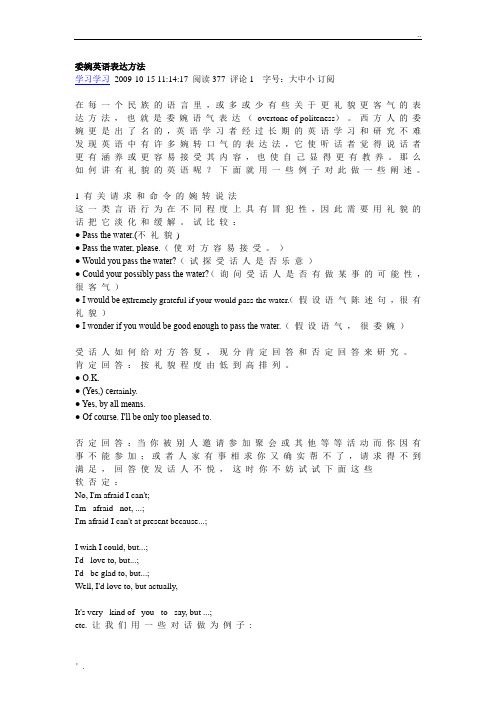
委婉英语表达方法学习学习2009-10-15 11:14:17 阅读377 评论1 字号:大中小订阅在每一个民族的语言里,或多或少有些关于更礼貌更客气的表达方法,也就是委婉语气表达(overtone of politeness)。
西方人的委婉更是出了名的,英语学习者经过长期的英语学习和研究不难发现英语中有许多婉转口气的表达法,它使听话者觉得说话者更有涵养或更容易接受其内容,也使自己显得更有教养。
那么如何讲有礼貌的英语呢?下面就用一些例子对此做一些阐述。
1 有关请求和命令的婉转说法这一类言语行为在不同程度上具有冒犯性,因此需要用礼貌的话把它淡化和缓解。
试比较:● Pass the water.(不礼貌)● Pass the water, please.(使对方容易接受。
)● Would you pass the water?(试探受话人是否乐意)● Could your possibly pass the water?(询问受话人是否有做某事的可能性,很客气)● I would be ext remely grateful if your would pass the water.(假设语气陈述句,很有礼貌)● I wonder if you would be good enough to pass the water.(假设语气,很委婉)受话人如何给对方答复,现分肯定回答和否定回答来研究。
肯定回答:按礼貌程度由低到高排列。
● O.K.● (Yes,) ce rtainly.● Yes, by all means.● Of course. I'll be only too pleased to.否定回答:当你被别人邀请参加聚会或其他等等活动而你因有事不能参加;或者人家有事相求你又确实帮不了,请求得不到满足,回答使发话人不悦,这时你不妨试试下面这些软否定:No, I'm afraid I can't;I'm afraid not, ...;I'm afraid I can't at present because...;I wish I could, but...;I'd love to, but...;I'd be glad to, but...;Well, I'd love to, but actually,It's very kind of you to say, but ...;etc. 让我们用一些对话做为例子:● A: We plan to go to the beach after class, want to come?B: I'd love to, but Pro. Jones wants to speak with me.● A: It never fails, It's raining hard outside and I'm stuck without an umbrella.B: I'd like to let you have mine, but I have to go out soon.● A: Will you go to the movies with me tonight?B: I'd love to, but I've caught a cold.● A: Could you possibly do me a favor?B: Sure, What is it?A: I've got a problem. I have to fix my table and I don't have a hammer. Could I possibly borrow yours?B: I'm sorry. I'm afraid I don't have one.A: Oh .Do you know anybody who does?B: Yes. You should call Charlie. I'm sure he'll be happy to lend you his.A: Thank you. I'll call him right away.● A: It's such a fine day, shall we go to the park for a walk?B: I'd like to join you, but I find it chilly to walk outside in spite of the sun.2 劝告的婉转法试比较下面句子(按从直截了当到较有礼貌的含蓄的劝告表达法排列)● You ought to type this paper.(有强加于人的意向)● You really should slow down at your o ffice.● You'd better tell him the truth.● I'd advise you to take a vacation.● You should take your parents' advice, they know what's best for you.● If I were you , I'd buy another car without hesitation.(含蓄地达到劝告目的)3 建议的表达法试比较:● I suggest you go for some advice.(不够礼貌,用于熟悉的人)● I would suggest starting the work at once.(较委婉)● You can read the novel now if you like.(给人选择余地,较客气)● You could/might have a look at the novel.(客气)● Why not call me next weeken d?(有礼貌的建议)● Why don't you find a decent job?(同5))● Can /may/Could/might I suggest that...?(使受话人容易接受)● It would be better if you copy that again.(假设条件句,容易使人接受)● I wonder if I might make the suggestion that...(用在正式场合,比如外交家的审慎的辞令风格)4 如何利用某些时态婉转地表达自己种种想法从上面所举例子,我们不难发现英语中有些时态其实并不表示真正的时态,而是与英语中的委婉语气密不可分的,例如:4.1 某些实意动词(want, wonder, think, hope等)的过去时、现在进行时、过去进行时表现在时比直接用现在时态更婉转,如:● A: Did you want me?B: Yes, I wondered if you could give me some help.● It's time you had a holiday.● I wish you lived closer to us.● If only you lent your book to me.● I'm hoping you'll give us some advice.● I'm wondering if I may have a word with you.● I was wondering /wondered if you'd like to come out with me one evening.● I was hoping / hoped you could send me some books.上面所举例子实际上都可以用一般现在时来代替,但是就不如用一般过去时;现在进行时或过去进行时委婉。
英语口语中的委婉与间接表达

英语口语中的委婉与间接表达是在交流过程中非常重要的一部分。
它们帮助我们以一种更加温和和礼貌的方式表达自己的意见或请求,同时也能避免冲突和争执。
在这篇文章中,我们将讨论一些常见的委婉表达方式,并了解如何在英语口语中使用它们。
首先,委婉表达在英语口语中是非常常见的。
它可以用于各种情况,比如请求、建议、拒绝和表示不同意等。
一个常见的委婉表达方式是使用“可能”或“也许”的词语来表示不确定性。
例如,我们可以说:“你可能会考虑一下…”或“也许我们可以考虑另一个办法…”,这样可以避免给对方压力或强加自己的意见。
另一个常见的委婉表达方式是使用“可能不是最好的”或“不太可能”来缓和自己的观点。
例如,我们可以说:“这个想法可能不是最好的,但是我们可以试试看”或“我不太可能能够来参加你的聚会,因为我有其他的安排”。
这样的表达方式使得我们的意见变得更加客观和不冒犯他人。
除了使用“可能”以外,我们还可以使用其他委婉的表达方式来表示自己的意见。
例如,我们可以使用“希望”或“可能性较小”的词语来减少对他人意见的冲突。
例如,我们可以说:“我希望我们能够找到一个共同的解决方案”或“我认为这种可能性较小,但是我们可以考虑一下”。
这样的表达方式能够显示我们的谦虚和尊重他人的观点。
此外,间接表达也是英语口语中的重要部分。
它可以帮助我们在提出请求或给予建议时保持礼貌。
一个常见的间接表达方式是使用条件句来表达我们的意图。
例如,我们可以说:“如果你有时间的话,是否可以帮我一个忙?”或“如果你愿意的话,我建议我们明天开始工作”。
通过使用这样的条件句,我们给对方提供了选择的机会,同时也显示了我们的尊重和礼貌。
除了条件句以外,我们还可以使用其他的间接表达方式来传达我们的意图。
例如,我们可以使用弱化语气,例如使用“我想”或“我觉得”来表达自己的请求或建议。
例如,我们可以说:“我想我们应该考虑一下其他的选择”或“我觉得你可能需要换一种方法来解决这个问题”。
英语的委婉,你懂吗
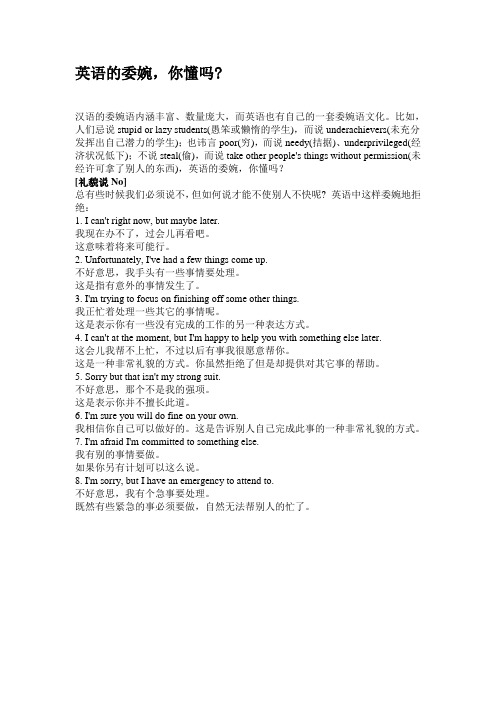
英语的委婉,你懂吗?汉语的委婉语内涵丰富、数量庞大,而英语也有自己的一套委婉语文化。
比如,人们忌说stupid or lazy students(愚笨或懒惰的学生),而说underachievers(未充分发挥出自己潜力的学生);也讳言poor(穷),而说needy(拮据)、underprivileged(经济状况低下);不说steal(偷),而说take other people's things without permission(未经许可拿了别人的东西),英语的委婉,你懂吗?[礼貌说No]总有些时候我们必须说不,但如何说才能不使别人不快呢? 英语中这样委婉地拒绝:1. I can't right now, but maybe later.我现在办不了,过会儿再看吧。
这意味着将来可能行。
2. Unfortunately, I've had a few things come up.不好意思,我手头有一些事情要处理。
这是指有意外的事情发生了。
3. I'm trying to focus on finishing off some other things.我正忙着处理一些其它的事情呢。
这是表示你有一些没有完成的工作的另一种表达方式。
4. I can't at the moment, but I'm happy to help you with something else later.这会儿我帮不上忙,不过以后有事我很愿意帮你。
这是一种非常礼貌的方式。
你虽然拒绝了但是却提供对其它事的帮助。
5. Sorry but that isn't my strong suit.不好意思,那个不是我的强项。
这是表示你并不擅长此道。
6. I'm sure you will do fine on your own.我相信你自己可以做好的。
这是告诉别人自己完成此事的一种非常礼貌的方式。
盘点:英语中那些委婉的语句是如何表达的

盘点:英语中那些委婉的语句是如何表达的在汉语中,进厂有许多委婉的词汇,其实在英语中也一样,今天小编给大家讲讲英语中那些委婉的语句是如何表达的。
死(death)这个词无论在什么样的文化当中,都是令人忌讳的。
在很多情况下,人们总是寻找一些中性的或具有积极意义的词汇来形容它。
汉语中就有“他走了”、“去见马克思了”等说法,英语中同样有许多“死”的委婉说法。
如:to pass away,to go home,to go,to go West,to breathe one's last,to be at rest,to depart,to be with God,to be in Heaven,to join the majority,to join one's ancestors,to fall asleep等。
例句:①Poor Milton was one of those who went West inthe air-crash.可怜的密尔顿是这次空难遇难者之一。
②His father passed away when he was only five.当他只有五岁时,他的父亲就去世了。
③He worked until he breathed his last.他一直工作到他生命的最后一刻。
除了“死”以外,还有其它许多词汇具有委婉的表达方式。
有些还需引起我们特别的注意,因为忽视或滥用这些用法有时会引起误解。
曾有一个中学生在公园中对一位外宾想要“洗手”(washone's hands)而感到大惑不解,连说“No water”(没有水)。
其实wash one's hands只是go to the toilet(lavatory)(上厕所)的委婉的说法。
厕所的其它表达方法还有comfort loom,men's(ladies')room,powderroom,cloakroom,washroom。
英语委婉语
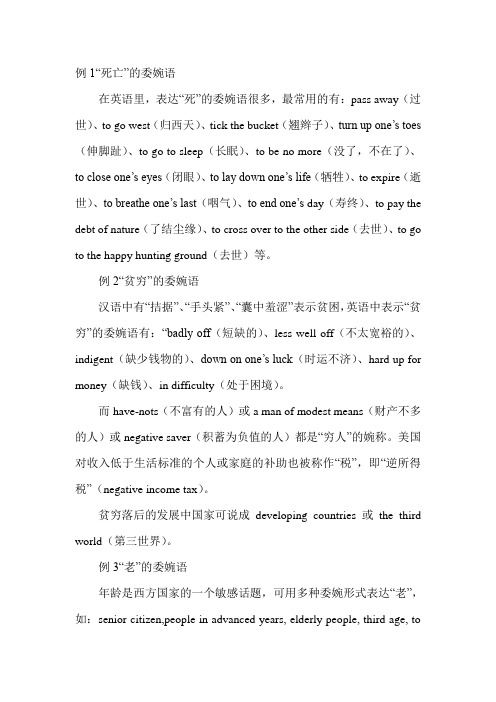
例1“死亡”的委婉语在英语里,表达“死”的委婉语很多,最常用的有:pass away(过世)、to go west(归西天)、tick the bucket(翘辫子)、turn up one’s toes (伸脚趾)、to go to sleep(长眠)、to be no more(没了,不在了)、to close one’s eyes(闭眼)、to lay down one’s life(牺牲)、to expire(逝世)、to breathe one’s last(咽气)、to end one’s day(寿终)、to pay the debt of nature(了结尘缘)、to cross over to the other side(去世)、to go to the happy hunting ground(去世)等。
例2“贫穷”的委婉语汉语中有“拮据”、“手头紧”、“囊中羞涩”表示贫困,英语中表示“贫穷”的委婉语有:“badly off(短缺的)、less well off(不太宽裕的)、indigent(缺少钱物的)、down on one’s luck(时运不济)、hard up for money(缺钱)、in difficulty(处于困境)。
而have-nots(不富有的人)或a man of modest means(财产不多的人)或negative saver(积蓄为负值的人)都是“穷人”的婉称。
美国对收入低于生活标准的个人或家庭的补助也被称作“税”,即“逆所得税”(negative income tax)。
贫穷落后的发展中国家可说成developing countries或the third world(第三世界)。
例3“老”的委婉语年龄是西方国家的一个敏感话题,可用多种委婉形式表达“老”,如:senior citizen,people in advanced years, elderly people, third age, tofeel one’s age, mature等。
英语中委婉语气的表达法
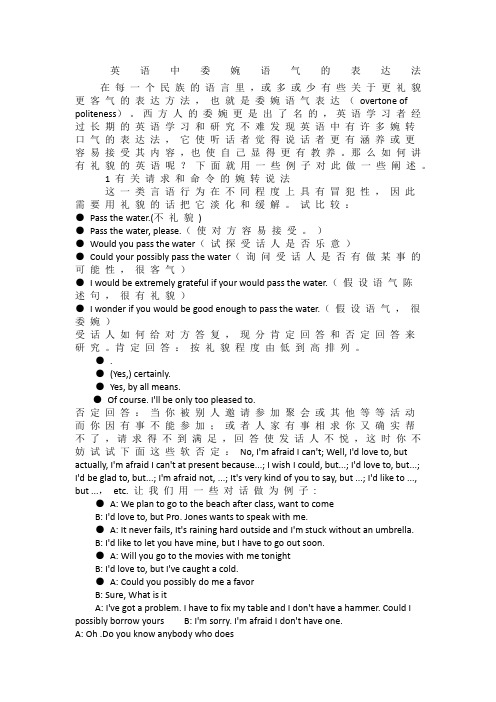
英语中委婉语气的表达法在每一个民族的语言里,或多或少有些关于更礼貌更客气的表达方法,也就是委婉语气表达(overtone of politeness)。
西方人的委婉更是出了名的,英语学习者经过长期的英语学习和研究不难发现英语中有许多婉转口气的表达法,它使听话者觉得说话者更有涵养或更容易接受其内容,也使自己显得更有教养。
那么如何讲有礼貌的英语呢?下面就用一些例子对此做一些阐述。
1 有关请求和命令的婉转说法这一类言语行为在不同程度上具有冒犯性,因此需要用礼貌的话把它淡化和缓解。
试比较:●Pass the water.(不礼貌)●Pass the water, please.(使对方容易接受。
)●Would you pass the water(试探受话人是否乐意)●Could your possibly pass the water(询问受话人是否有做某事的可能性,很客气)●I would be extremely grateful if your would pass the water.(假设语气陈述句,很有礼貌)●I wonder if you would be good enough to pass the water.(假设语气,很委婉)受话人如何给对方答复,现分肯定回答和否定回答来研究。
肯定回答:按礼貌程度由低到高排列。
●.●(Yes,) certainly.●Yes, by all means.●Of course. I'll be only too pleased to.否定回答:当你被别人邀请参加聚会或其他等等活动而你因有事不能参加;或者人家有事相求你又确实帮不了,请求得不到满足,回答使发话人不悦,这时你不妨试试下面这些软否定:No, I'm afraid I can't; Well, I'd love to, but actually, I'm afraid I can't at present because...; I wish I could, but...; I'd love to, but...; I'd be glad to, but...; I'm afraid not, ...; It's very kind of you to say, but ...; I'd like to ..., but ...,etc. 让我们用一些对话做为例子:●A: We plan to go to the beach after class, want to comeB: I'd love to, but Pro. Jones wants to speak with me.●A: It never fails, It's raining hard outside and I'm stuck without an umbrella.B: I'd like to let you have mine, but I have to go out soon.●A: Will you go to the movies with me tonightB: I'd love to, but I've caught a cold.●A: Could you possibly do me a favorB: Sure, What is itA: I've got a problem. I have to fix my table and I don't have a hammer. Could I possibly borrow yours B: I'm sorry. I'm afraid I don't have one.A: Oh .Do you know anybody who doesB: Yes. You should call Charlie. I'm sure he'll be happy to lend you his.A: Thank you. I'll call him right away.●A: It's such a fine day, shall we go to the park for a walkB: I'd like to join you, but I find it chilly to walk outside in spite of the sun.2 劝告的婉转法试比较下面句子(按从直截了当到较有礼貌的含蓄的劝告表达法排列)●You ought to type this paper.(有强加于人的意向)●You really should slow down at your office.●You'd better tell him the truth.●I'd advise you to take a vacation.●You should take your parents' advice, they know what's best for you.●If I were you , I'd buy another car without hesitation.(含蓄地达到劝告目的)3 建议的表达法试比较:●I suggest you go for some advice.(不够礼貌,用于熟悉的人)●I would suggest starting the work at once.(较委婉)●You can read the novel now if you like.(给人选择余地,较客气)●You could/might have a look at the novel.(客气)●Why not call me next weekend(有礼貌的建议)●Why don't you find a decent job(同5))●Can /may/Could/might I suggest that...(使受话人容易接受)●It would be better if you copy that again.(假设条件句,容易使人接受)●I wonder if I might make the suggestion that...(用在正式场合,比如外交家的审慎的辞令风格)4 如何利用某些时态婉转地表达自己种种想法从上面所举例子,我们不难发现英语中有些时态其实并不表示真正的时态,而是与英语中的委婉语气密不可分的,例如:某些实意动词(want, wonder, think, hope等)的过去时、现在进行时、过去进行时表现在时比直接用现在时态更婉转,如:●A: Did you want meB: Yes, I wondered if you could give me some help.●It's time you had a holiday.●I wish you lived closer to us.●If only you lent your book to me.●I'm hoping you'll give us some advice.●I'm wondering if I may have a word with you.●I was wondering /wondered if you'd like to come out with me one evening.●I was hoping / hoped you could send me some books.上面所举例子实际上都可以用一般现在时来代替,但是就不如用一般过去时;现在进行时或过去进行时委婉。
英语委婉语常见的表达方式
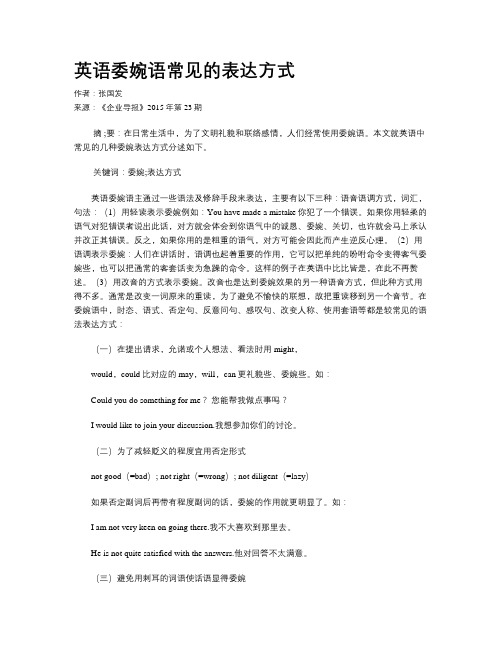
英语委婉语常见的表达方式作者:张国发来源:《企业导报》2015年第23期摘 ;要:在日常生活中,为了文明礼貌和联络感情,人们经常使用委婉语。
本文就英语中常见的几种委婉表达方式分述如下。
关键词:委婉;表达方式英语委婉语主通过一些语法及修辞手段来表达,主要有以下三种:语音语调方式,词汇,句法:(1)用轻读表示委婉例如:You have made a mistake你犯了一个错误。
如果你用轻柔的语气对犯错误者说出此话,对方就会体会到你语气中的诚恳、委婉、关切,也许就会马上承认并改正其错误。
反之,如果你用的是粗重的语气,对方可能会因此而产生逆反心理。
(2)用语调表示委婉:人们在讲话时,语调也起着重要的作用,它可以把单纯的吩咐命令变得客气委婉些,也可以把通常的客套话变为急躁的命令。
这样的例子在英语中比比皆是,在此不再赘述。
(3)用改音的方式表示委婉。
改音也是达到委婉效果的另一种语音方式,但此种方式用得不多。
通常是改变一词原来的重读,为了避免不愉快的联想,故把重读移到另一个音节。
在委婉语中,时态、语式、否定句、反意问句、感叹句、改变人称、使用套语等都是较常见的语法表达方式:(一)在提出请求,允诺或个人想法、看法时用might,would,could比对应的may,will,can更礼貌些、委婉些。
如:Could you do something for me?您能帮我做点事吗?I would like to join your discussion.我想参加你们的讨论。
(二)为了减轻贬义的程度宜用否定形式not good(=bad); not right(=wrong); not diligent(=lazy)如果否定副词后再带有程度副词的话,委婉的作用就更明显了。
如:I am not very keen on going there.我不大喜欢到那里去。
He is not quite satisfied with the answers.他对回答不太满意。
英汉两种语言中的委婉语

英汉两种语言中的委婉语
委婉语是指当人们要谈论生活中那些惹人不快、让人尴尬、招人厌恶和令人恐惧的事物时所用的词和短语。
英汉两种语言有的委婉语是相同的,比如“死亡”,汉语用“过世了”,英语说“pass away”;“上厕所”,汉语用“去洗手间”,英语说“go to the washroom”。
但是,不同的用法也很多,不能硬译。
比如,“他有经济问题”,意为“He is corrupted.”或“He has accepted the bribery.”不能硬译为“He has the problem of economy.”。
对于“老”,中国人尊老,对年纪大的人尊称“老人家”,而西方人对“老”总有一种恐惧,于是避免说“老”也成了委婉语。
比如,“老人家,麻烦你让一下!”如果译成“Trouble you, old man! Let me pass!”就是典型的中式英语了。
这种情况在英语中一般就表达为“Excuse me, sir!”所以,我们应该多了解英汉两种语言中的委婉语,才能更好地准确表达意思。
英语中委婉表达的19种构词方法
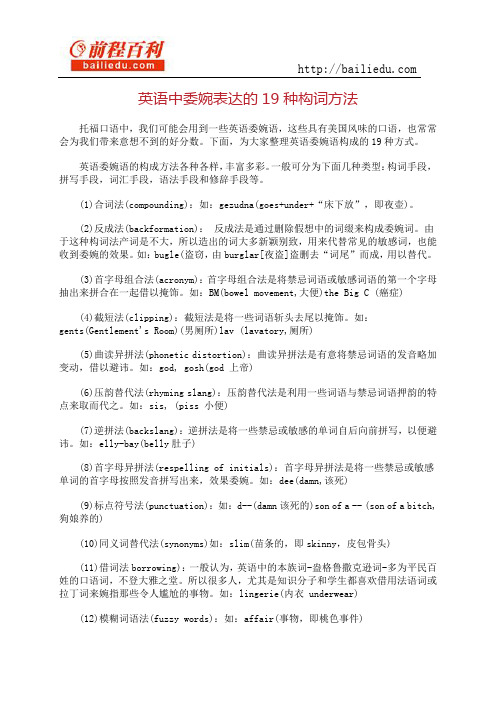
托福口语中,我们可能会用到一些英语委婉语,这些具有美国风味的口语,也常常会为我们带来意想不到的好分数。
下面,为大家整理英语委婉语构成的19种方式。
英语委婉语的构成方法各种各样,丰富多彩。
一般可分为下面几种类型:构词手段,拼写手段,词汇手段,语法手段和修辞手段等。
(1)合词法(compounding):如:gezudna(goes+under+“床下放”,即夜壶)。
(2)反成法(backformation):反成法是通过删除假想中的词缀来构成委婉词。
由于这种构词法产词是不大,所以造出的词大多新颖别致,用来代替常见的敏感词,也能收到委婉的效果。
如:bugle(盗窃,由burglar[夜盗]盗删去“词尾”而成,用以替代。
(3)首字母组合法(acronym):首字母组合法是将禁忌词语或敏感词语的第一个字母抽出来拼合在一起借以掩饰。
如:BM(bowel movement,大便)the Big C (癌症)(4)截短法(clipping):截短法是将一些词语斩头去尾以掩饰。
如:gents(Gentlement's Room)(男厕所)lav (lavatory,厕所)(5)曲读异拼法(phonetic distortion):曲读异拼法是有意将禁忌词语的发音略加变动,借以避讳。
如:god, gosh(god 上帝)(6)压韵替代法(rhyming slang):压韵替代法是利用一些词语与禁忌词语押韵的特点来取而代之。
如:sis, (piss 小便)(7)逆拼法(backslang):逆拼法是将一些禁忌或敏感的单词自后向前拼写,以便避讳。
如:elly-bay(belly肚子)(8)首字母异拼法(respelling of initials):首字母异拼法是将一些禁忌或敏感单词的首字母按照发音拼写出来,效果委婉。
如:dee(damn,该死)(9)标点符号法(punctuation):如:d--(damn该死的)son of a -- (son of a bitch,狗娘养的)(10)同义词替代法(synonyms)如:slim(苗条的,即skinny,皮包骨头)(11)借词法borrowing):一般认为,英语中的本族词-盎格鲁撒克逊词-多为平民百姓的口语词,不登大雅之堂。
英语委婉语气表达法
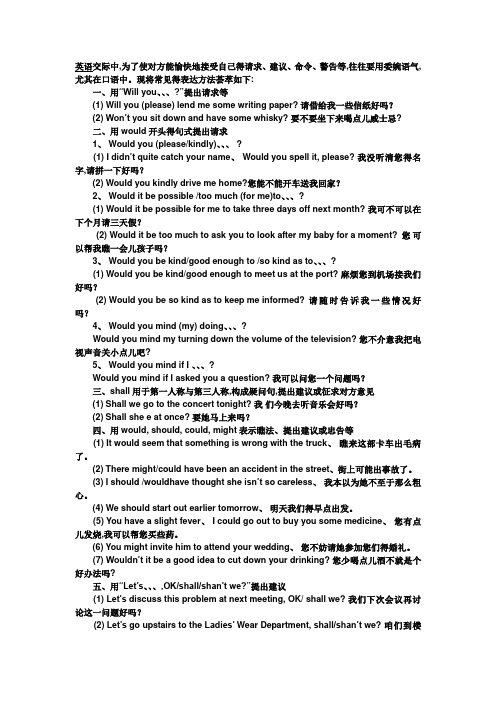
英语交际中,为了使对方能愉快地接受自己得请求、建议、命令、警告等,往往要用委婉语气,尤其在口语中。
现将常见得表达方法荟萃如下:一、用“Will you、、、?”提出请求等(1) Will you (please) lend me some writing paper? 请借给我一些信纸好吗?(2) Won’t you sit down and have some whisky? 要不要坐下来喝点儿威士忌?二、用would开头得句式提出请求1、 Would you (please/kindly)、、、 ?(1) I didn’t quite catch your name、 Would you spell it, please? 我没听清您得名字,请拼一下好吗?(2) Would you kindly drive me home?您能不能开车送我回家?2、 Would it be possible /too much (for me)to、、、?(1) Would it be possible for me to take three days off next month? 我可不可以在下个月请三天假?(2) Would it be too much to ask you to look after my baby for a moment? 您可以帮我瞧一会儿孩子吗?3、 Would you be kind/good enough to /so kind as to、、、?(1) Would you be kind/good enough to meet us at the port? 麻烦您到机场接我们好吗?(2) Would you be so kind as to keep me informed? 请随时告诉我一些情况好吗?4、 Would you mind (my) doing、、、?Would you mind my turning down the volume of the television? 您不介意我把电视声音关小点儿吧?5、 Would you mind if I 、、、?Would you mind if I asked you a question? 我可以问您一个问题吗?三、shall用于第一人称与第三人称,构成疑问句,提出建议或征求对方意见(1) Shall we go to the concert tonight? 我们今晚去听音乐会好吗?(2) Shall she e at once? 要她马上来吗?四、用would, should, could, might表示瞧法、提出建议或忠告等(1) It would seem that something is wrong with the truck、瞧来这部卡车出毛病了。
英语委婉语资料
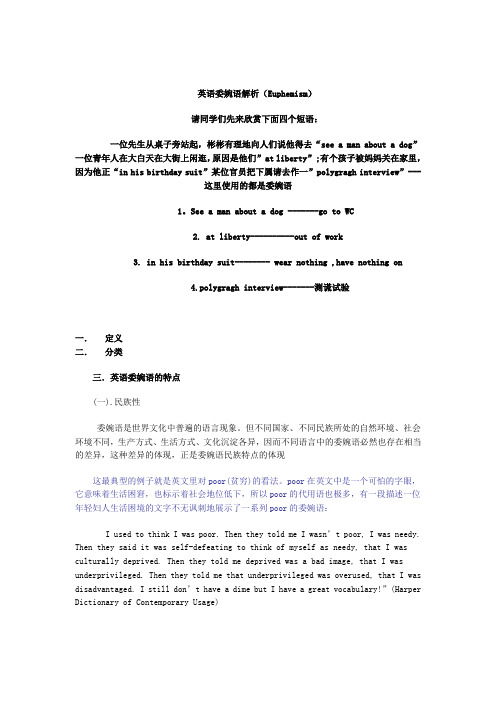
英语委婉语解析(Euphemism)请同学们先来欣赏下面四个短语:一位先生从桌子旁站起,彬彬有理地向人们说他得去“see a man about a dog”一位青年人在大白天在大街上闲逛,原因是他们”at liberty”;有个孩子被妈妈关在家里,因为他正“in his birthday suit”某位官员把下属请去作一”polygragh interview”---这里使用的都是委婉语1。
See a man about a dog -------go to WC2. at liberty----------out of work3. in his birthday suit-------- wear nothing ,have nothing on4.polygragh interview-------测谎试验一.定义二.分类三.英语委婉语的特点(一).民族性委婉语是世界文化中普遍的语言现象。
但不同国家、不同民族所处的自然环境、社会环境不同,生产方式、生活方式、文化沉淀各异,因而不同语言中的委婉语必然也存在相当的差异,这种差异的体现,正是委婉语民族特点的体现这最典型的例子就是英文里对poor(贫穷)的看法。
poor在英文中是一个可怕的字眼,它意味着生活困窘,也标示着社会地位低下,所以poor的代用语也极多,有一段描述一位年轻妇人生活困境的文字不无讽刺地展示了一系列poor的委婉语:I used to think I was poor. Then they told me I wasn’t poor, I was needy. Then they said it was self-defeating to think of myself as needy, that I was culturally deprived. Then they told me deprived was a bad image, that I was underprivileged. Then they told me that underprivileged was overused, that I was disadvantaged. I still don’t have a dime but I have a great vocabulary!”(Harper Dictionary of Contemporary Usage)这段话的大意是:“起初我认为自己贫穷。
英语委婉语中的三种表达手段

象 就 是 委 婉 表 达 法 (u h miig , 量 e p e zn ) 大
的 委 婉 语 ( u h mi ) 此 产 生 。 e pe s 由 m E p e s 一 词 源 于 希 腊 语 的 前 u h mim 缀 ,u = o d,o n ig wel 好 的 , e 一( g o su dn l, 好 听 的 ) 词根 pe 和 h me( s e c o a ig, = p e h r syn 话 语 或 说 话 ) E p e s 字 面 上 的 意 义 。 u h mim 就 是 “ 好 听 的或 令 人 愉 快 的 方 式 表 达 ” 用
调Hale Waihona Puke ; 汇 ; 法 词 语中 是 一 个 令 人 感 到 恐 怖 、 痛 、 祥 的 伤 不 字 眼 , 人 们 最 不 愿 提 及 但 又 非 得 说 出 是 口 的 事 实 。 于 是 , 了 慰 藉 亡 灵 , 为 了 为 也 抚 慰 生 者 ,还 为 自己 欺 骗 忧 伤 的 心 , 人
( 容师 ) 美 ,把 u d r k r ( 仪 员 ) 叫 做 n e ae 殡 t g e hrps( 痛 治 疗 专 家 ) i r ftea i 悲 t 。
( ) 音 手段 表示 委婉 一 语 说 话 人 通 过 省 音 ,变 音 和 避 音 来 达 到委婉效果。 省 音 :通 过 简 写 或 者 省 掉 某 些 音 节 以
(o s e k wi g o wo d o i a t p a t h od rs r n
pe s n n e ) l a a t ma n r 。
- 1、下载文档前请自行甄别文档内容的完整性,平台不提供额外的编辑、内容补充、找答案等附加服务。
- 2、"仅部分预览"的文档,不可在线预览部分如存在完整性等问题,可反馈申请退款(可完整预览的文档不适用该条件!)。
- 3、如文档侵犯您的权益,请联系客服反馈,我们会尽快为您处理(人工客服工作时间:9:00-18:30)。
委婉英语表达方法学习学习2009-10-15 11:14:17 阅读377 评论1 字号:大中小订阅在每一个民族的语言里,或多或少有些关于更礼貌更客气的表达方法,也就是委婉语气表达 ( overtone of politeness ) 。
西方人的委婉更是出了名的,英语学习者经过长期的英语学习和研究不难发现英语中有许多婉转口气的表达法,它使听话者觉得说话者更有涵养或更容易接受其内容,也使自己显得更有教养。
那么如何讲有礼貌的英语呢?下面就用一些例子对此做一些阐述。
1 有关请求和命令的婉转说法这一类言语行为在不同程度上具有冒犯性,因此需要用礼貌的话把它淡化和缓解。
试比较:•Pass the water.(不礼貌)•Pass the water, please. (使对方容易接受。
)•Would you pass the water? (试探受话人是否乐意)•Could your possibly pass the water? (询问受话人是否有做某事的可能性,很客气)•I would be extremely grateful if your would pass the water. (假设语气陈述句,很有礼貌)•I wonder if you would be good enough to pass the water. (假设语气,很委婉)受话人如何给对方答复,现分肯定回答和否定回答来研究。
肯定回答:按礼貌程度由低到高排列。
•O.K.•(Yes,) certainly.•Yes, by all means.•Of course. I'll be only too pleased to.否定回答:当你被别人邀请参加聚会或其他等等活动而你因有事不能参加;或者人家有事相求你又确实帮不了,请求得不到满足,回答使发话人不悦,这时你不妨试试下面这些软否定:No, I'm afraid I can't;I'm afraid not, ...;I'm afraid I can't at present because...;I wish I could, but...;I'd love to, but...;I'd be glad to, but...;Well, I'd love to, but actually,It's very kind of you to say, but ...;etc. 让我们用一些对话做为例子:•A: We plan to go to the beach after class, want to come?B: I'd love to, but Pro. Jones wants to speak with me.•A: It never fails, It's raining hard outside and I'm stuck without an umbrella. B: I'd like to let you have mine, but I have to go out soon.•A: Will you go to the movies with me tonight?B: I'd love to, but I've caught a cold.•A: Could you possibly do me a favor?B: Sure, What is it?A: I've got a problem. I have to fix my table and I don't have a hammer. Could I possibly borrow yours?B: I'm sorry. I'm afraid I don't have one.A: Oh .Do you know anybody who does?B: Yes. You should call Charlie. I'm sure he'll be happy to lend you his.A: Thank you. I'll call him right away.•A: It's such a fine day, shall we go to the park for a walk?B: I'd like to join you, but I find it chilly to walk outside in spite of the sun.2 劝告的婉转法试比较下面句子(按从直截了当到较有礼貌的含蓄的劝告表达法排列)• You ought to type this paper.( 有 强 加 于 人 的 意 向 )• You really should slow down at your office.• You'd better tell him the truth.• I'd advise you to take a vacation.• You should take your parents' advice, they know what's best for you.• If I were you , I'd buy another car without hesitation.的) 4 如何利用某些时态婉转地表达自己种种想法 从 上 面 所 举 例 子 ,我 们 不 难 发 现 英 语 中 有 些 时 态 其 实 并 不 表 示 真正的时态,而是与英语中的委婉语气密不可分的,例如:含蓄地达到劝告目3 建议的表达法试比较:• I suggest you go for some advice.( 不• I would suggest starting the work at once.• You can read the novel now if you like.• You could/might have a look at the novel.• Why not call me next weekend?( • Why don't you find a decent job? • Can /may/Could/might I suggest that...?• It would be better if you copy that again.• I wonder if I might make the suggestion that...家的审慎的辞令风格)够礼貌,用于熟悉的人) (较委婉)给人选择余地,较客气) 客气)有礼貌的建议) (同 5 ) )(使受话人容易接受) ( 假 设 条 件 句 ,容 易 使 人 接 受 )4.1 某些实意动词 ( want, wonder, think, hope 等 ) 的过去时、现在进行时、过去进行时表现在时比直接用现在时态更婉转,如:•A: Did you want me?B: Yes, I wondered if you could give me some help.•It's time you had a holiday.•I wish you lived closer to us.•If only you lent your book to me.•I'm hoping you'll give us some advice.•I'm wondering if I may have a word with you.•I was wondering /wondered if you'd like to come out with me one evening.•I was hoping / hoped you could send me some books.上面所举例子实际上都可以用一般现在时来代替,但是就不如用一般过去时;现在进行时或过去进行时委婉。
如:I was wondering whether you could help me do something on our wedding.这是一句非常礼貌的话,比“ Could you help me do something on our wedding?" 要客气得多。
它用的是过去进行时,表达的意思却是现在。
这句话可以翻译成:“ 不知能否劳驾您在我们婚礼上帮我做点事情?如果我们沿用传统的时态概念,把这句话改成后者,那么,整句话的语气大变,显得生硬。
更遭的是,句子产生了两种负面意义:我不知道你帮不帮我做这件事;对你否帮我做这事,我持怀疑态度。
而用过去进行时,则不会产生以上错误理解。
4.2 一些情态动词或其他动词的过去时也用来表示委婉语气,实际上是虚拟语气,表假设、愿望、建议、猜测、怀疑而已。
而没有时间上的差别,如:•She might ( may )have missed the train. ( 既是虚拟语气,也表委婉 ) 。
•We might all have been indulging in an illusion.•It might be an idea to try this one again.•I would (will)suggest you copied this out again.•Sally couldn't love him.•It would be better if you wrote in ink..•You'd(You had(have)) better be careful next time.•I'd rather you finished this off before Friday.•I'd rather you didn't look at the answer or ask others for help.•This handbag could be Mary's.•A: Could/might I smoke here?B: Yes, of course you can. /No, I'm afraid not. •Should I turn off the light?•What should we do next?•I should say he is just the right man for this job.•I should think your approach is correct.•I don't think he would be so absent -minded.•It would be a pity to stop our work half -way.•Would you like to stay here for the night?•What would you advise me to do?•If I had a chance, I'd major in economics.•It's a pity if they should be so obstinate•I wouldn't go there unless they should force me to go.•We would reduce our price rather than lose the business.假如上面例子的时态变成现在时的话,意思虽然没变,但语气就不如用用过去式婉转。
